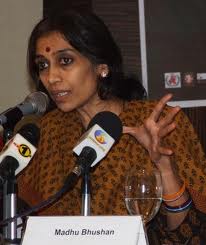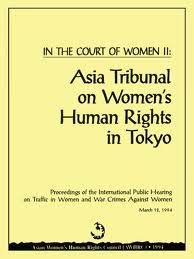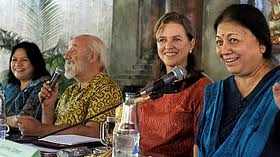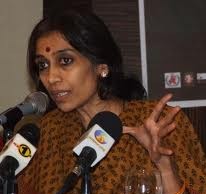En relation avec le thème de ce numéro sur la rencontre entre Orient et Occident :
Du Conseil des femmes asiatiques pour les droits humains (AWHRC) dont le siège est à Manille (Philippines).
« En 1986, quelques femmes asiatiques se réunissaient à Bangkok (Thaïlande) pour débattre des luttes féminines dans leurs pays. C’est à la suite de cette rencontre que le Conseil fut créé. Fondé sur un principe fondamental : les droits de l’homme sont aussi les droits de la femme, il se proposait d’appréhender les droits humains qui s’attachent à la problématique hommes-femmes.
« L’AWHRC développe ses actions dans trois directions :
– éduquer le public
– renforcer les capacités des femmes et leur accès à l’information
– combattre la pensée dominante qui, dans le monde, accepte et cultive la violence.

Les initiatives
« Ce réseau régional a engagé plusieurs initiatives notables qui couvrent quatre domaines :
la recherche et la collecte de données, dont celles sur la « prostitution militaire » et le tourisme sexuel
le lobbying politique : l’AWHRC participe à des conférences nationales, régionales et internationales ainsi qu’à des commissions et à leur préparation, dont un nombre important de commissions des Nations Unies
la diffusion de l’information par l’intermédiaire de sa propre publication, The Quilt, et de Asian Womenews
l’audition publique de témoins (Public Hearings).
Les tribunaux de femmes
« Cette dernière initiative mérite une attention spéciale et présente un intérêt particulier pour les militants des droits humains qui recherchent des moyens de « base » pour assurer la justice et la réparation des crimes commis contre les femmes.
« C’est en 1993 que l’AWHRC a commencé à promouvoir ces auditions publiques, connues sous le nom de « tribunaux de femmes » (Women’s Court). Elles traitent d’une grande variété de questions relatives aux « crimes contre les femmes dans la région Asie-Pacifique ». A ce jour, l’AWHRC a patronné ou co-organisé sept tribunaux de femmes dans diverses villes de la région. Des groupes de femmes et un large public assistent à ces audiences. Elles donnent aux femmes qui ont été victimes de persécutions, discriminations et violences du fait de leur sexe, l’occasion de présenter leurs cas.
« En 1993-1995, sept tribunaux de femmes ont ainsi été réunis à Lahore (Pakistan), Tokyo (Japon), Bangalore (Inde), Le Caire (Egypte), Manille (Philippines), portant sur un ensemble de questions : violences contre les femmes, crimes de guerre et traite des femmes, crimes contre les femmes dalit et indigènes, conséquences sur les femmes des politiques démographiques, du modèle dominant de développement, du choix nucléaire. Le point culminant de ces initiatives a été l’audience publique mondiale qui s’est tenue pendant le forum des ONG lors de la quatrième Conférence mondiale sur les femmes (Pékin, septembre 1995).

« Les auditions publiques représentent une façon innovante de traiter la violation des droits humains à l’encontre des femmes. Plus encore, elles produisent des résultats assez impressionnants en ce qui concerne la prise de conscience des victimes et elles leur offrent un moyen d’exprimer leur douleur et leur colère et d’amorcer un processus de guérison. En exposant leurs cas, les victimes espèrent contribuer à rassembler une documentation et des données sur ce type de crimes. Une information qui voudrait aussi aider à développer des stratégies de dédommagement au niveau local, national, régional et international. Finalement, l’AWHRC souhaite que ces audiences publiques contribuent au changement structurel indispensable et fassent que la justice ne soit plus aveugle aux abus et violations spécifiques perpétrés contre les femmes. Par leur existence même, ces tribunaux de femmes démontrent que notre système judiciaire actuel traite les droits des femmes en tant que droits humains de façon inadéquate. »
Source DPH
ci-dessous en anglais :
South East Asia’s first « Women’s Court » on trafficking and HIV – August 2009
Bali – Harrowing personal stories narrated by more than 20 women who have endured trafficking, violence, exploitation and HIV will mark the first “South East Asia (SEA) Court of Women on HIV and Human Trafficking: from Vulnerability to free, Just and Safe Movement” to be held in Bali, Indonesia on 6 August.

Organised by UNDP, Asian Women’s Human Rights Council (AWHRC) and Yakeba – a Balinese NGO with financial support from the Government of Japan, together with a broad range of UN and CSO partners, the Court is being held in conjunction with the 9th International Congress on AIDS in Asia and the Pacific (ICAAP9) that gets underway here from 9 August.
At the Court, Wanta, a young HIV positive Cambodian woman will narrate her personal account of exploitation at the hands of trans-border traffickers that landed her in bonded sex work in Malaysia. Today she is back in Phnom Penh, living with HIV among many other voiceless survivors of trafficking. The case of Nitha, from Indonesia will expose the unspeakable violence faced by poor women from the region who go to the Arab States region as domestic workers. Another compelling case will be that of Rina, a trafficking survivor from Myanmar, who was chased by the same law that was meant to protect her. Other testifiers will share in their own voice the many forms of violence and exploitation that poor women in the region face in their daily lives.
The Court will employ a unique format of weaving the objective and the subjective as well as the personal and the political to bring out the intense violation of dignity and rights of women. It will also feature substantive analyses on the issue by experts from the region and elsewhere. “The testimonies will be presented before an eminent jury of wise women and men validating their experiences, legitimizing their memories and seeking new ways of justice,“ said Ms. Corinne Kumar, International Coordinator, Courts of Women.
“The Women’s Court is both a call for action against human trafficking and HIV, and a testament to the resilience and courage of women from the region who have survived unspeakable exploitation and violence,” said Caitlin Wiesen, Regional HIV/AIDS Practice Leader & Programme Coordinator, Asia & Pacific, UNDP. It is estimated that the region accounts for one third of human trafficking in the world. Countries in the region are source, transit and destination areas for human trafficking. There are cases where women are trafficked across the border into surrogacy, sexual slavery and bonded labour, which will be presented as testimonies at the Court. Ms. Caitlin Wiesen, said the Court and the testimonies are not a one-off event, but are part of a process aimed at making a difference to countless women who are subjected to trafficking, violence and exploitation and are vulnerable to HIV in South East Asia. The Court will bring forth evidence on the diverse forms of exploitation that women suffer during their voluntary and forced movement within and across national borders.
Ms. Corinne Kumar, said “the concepts and categories that we use are unable to grasp the violation against women. The existing jurisprudence is gender-blind and we need to move towards a justice that is restorative and healing of individuals and communities.” ‘It is essential that the linkages between HIV and human trafficking be viewed and addressed through the prism of dignity, access to justice, health and human security of individuals and communities, she added.
Her Excellency Meutia Hatta, Minister for Women’s Empowerment from Indonesia will officially open the Court while Dr. Nafis Sadik, UN Secretary General’s Special Envoy on HIV/AIDS in Asia and the Pacific region, will deliver the key note address.
This event is a major partnership initiative involving United Nations Office on Drugs and Crime (UNODC), United Nations Development Fund for Women (UNIFEM), United Nations Inter- Agency Project on Human Trafficking (UNIAP) and Asia Pacific Network of People living with HIV (APN+) with financial support from the Government of Japan. The Court will bring together leaders, politicians, activists and communities who are working to make a difference to empower women and reduce their vulnerability to trafficking and HIV in the South East Asia region.
The eminent jury will include Prof. Vitit Muntarbhorn (Prof. of Law and Former UN Special Rapporteur of the Commission on Human Rights on the sale of children, child prostitution and child pornography, Thailand), Marina Mahathir (Steering Committee Member, Asia Pacific Leadership Forum on HIV/AIDS and Development, Malaysia), Annette Sykes (Lawyer, New Zealand), Sylvia Marcos (Director, Center for Psycho-ethnological Research, Mexico), Mieke Komar Kantaatmadja (Supreme Court Justice, Indonesia) and Esperanza I. Cabral (Secretary, Department of Social Welfare and Development, Philippines).
The Women’s Court will have four sessions: human rights of vulnerable communities; public health impact of anti trafficking legislation; and responses from communities (celebrating women’s successes on overcoming various challenges). The sessions of the Court will be introduced by a group of “Expert Witnesses” comprising Mabel Bianco (Argentina), Prof. Irwanto (Indonesia), Irene Fernandez (Malaysia), Vichuta Ly (Cambodia) and Eni Lestari (Hong Kong).
The Court will end on a celebratory note. A Talking Poleng made by the participants of the Court with expressions of hope, strength, solidarity and commitment will be unveiled by distinguished guests and speakers. In addition, a traditional Balinese dance called Mulat Sarira will be performed by a dance group based in Bali.
Source PNUD : programme des nations unis pour le développement
Articles en relation avec le dossier du numéro : Orient/Occident
Il manque désormais plus de 100 millions de femmes en Asie
Quatre projets pour les femmes en Asie du Sud
Suicide de femmes au Népal
Tribunaux de femmes en Asie
L’exil des veuves
Le sati en Inde ou le bûcher pour les veuves







